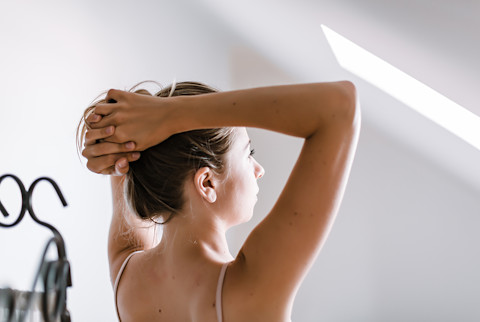
The sunset will be an hour later this Sunday, March 12—welcome news for those of us in the Northern Hemisphere growing weary of winter.
Spring forward is an exciting time to soak up more sun (and that all-important vitamin D) and get ourselves moving outdoors again. But it's also an adjustment period that can take a temporary hit on our sleep. Here, clinical psychologist, board-certified sleep specialist, and Oura Sleep Advisor, Michael J. Breus, Ph.D., explains why the time change might throw off your week and how to get back on track quickly.
Why spring forward can mess with sleep.
Most of us lose between 40 and 60 minutes of sleep1 every time the clock turns forward; one reason why a growing chorus of health care professionals is petitioning to switch over to a fixed year-round time.
Breus notes that while an hour of sleep loss might not seem like a lot, it's certainly enough to negatively affect our energy levels and mood. Especially if you had any sleep debt going into this weekend, you'll likely feel groggy and irritable heading into the coming week. "There's no way around it," he tells mbg. "You are losing an hour, so you are likely making a bad situation worse."
This time change can also be an unwelcome surprise for our body's circadian rhythm. This biological clock that sits in the brain's hypothalamus dictates the timing of our sleep-wake cycle (when we feel tired and awake) and other key processes like appetite. To stay on track, it relies on cues from natural sunlight and darkness.
While a small change in light-dark timing is no big deal, an hour shift can confuse our internal timekeeper and cause us to feel a little off. Breus equates it to the funny feeling we may get when traveling one time zone away.
What to do to get back on track.
In an ideal world, you spent last week preparing for spring forward by going to bed 15 minutes earlier every night. If that didn't happen, no big deal. Here are some quick ways to help your body adjust now that the clocks have changed:
- Get some sun first thing in the morning: Help your circadian rhythm adjust to the new schedule by exposing yourself to some morning light. Heading out for a walk in the morning will be ideal, but Jamie Zeitzer, Ph.D., an associate professor of sleep medicine at Stanford University, notes that standing in front of a window will also work in a pinch—though the light won't be as bright. Even on cloudy days, the light we get outdoors far surpasses anything we can soak up inside.
- Keep things dark at night: Always a good sleep hygiene habit, this one's especially important this week. To train your body to adjust to the new time, aim to turn off all bright lights and electronics around sunset. Let the light (or lack of light) outside dictate the light in your space.
- Stick to a consistent wake-up time: Breus' No. 1 rule for high-quality sleep is super simple: Wake up at the same time every day. While you may feel a little sleepy the next few mornings, getting yourself out of bed at the same time will send a signal to your body and circadian clock to stay on track.
- Get ahead of the spring pollen: Finally, as we inch closer to spring, Breus notes that seasonal sniffles may start disrupting your sleep. Get ahead of them by doing some deep breathing at night. "I think we've all felt the relief that a deep healing breath can provide as it increases our body's oxygen levels and encourages our bodies to enter a state of restfulness," he says. Here's a simple soothing routine to try tonight.
The takeaway.
If ever there was a week to pay attention to your sleep, this is it! Sleep Awareness Week in the U.S. coincides with the aftermath of spring forward—a time when we could all stand to prioritize high-quality rest with strategically timed light exposure, strict wake-up habits, soothing nightly routines, and maybe a sleep-supporting gadget or supplement to really set the tone for a lively spring.*

